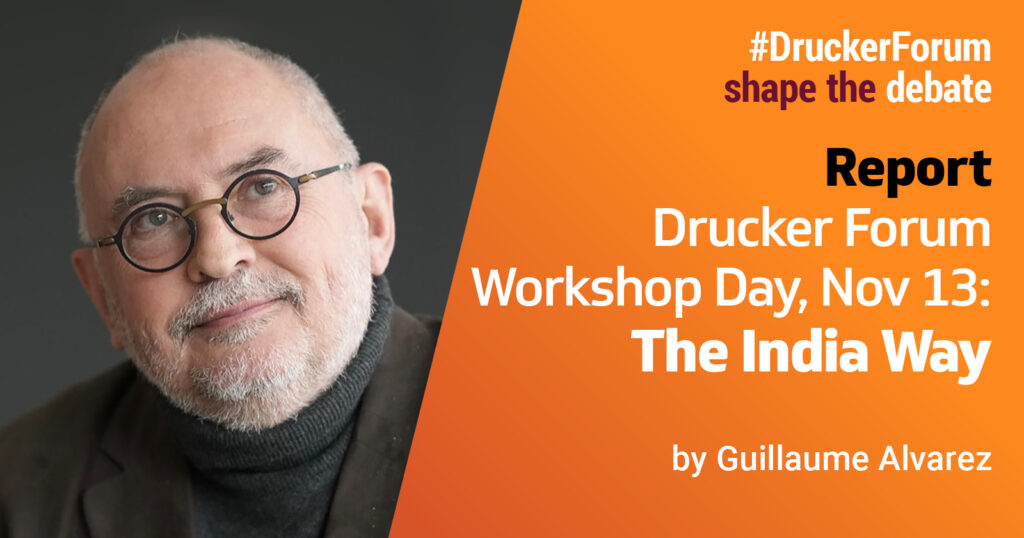
On Wednesday November 13, 2024, “The India Way” workshop took place in Vienna as part of the Drucker Forum and in collaboration with the Living Machine Institute and Invest India.
Echoing Peter Drucker’s vision of the “Next Society”, Richard Straub, founder of the Global Peter Drucker Forum, has launched an ambitious initiative called “The Next Management”, aimed at reframing management for the 21st century.
The so-called India way offers a tangible and intriguing example of a Next Management pathway. Ratan Tata, former chairman of Tata Trusts, said: ” I believe it’s important to have companies survive over the long term. I hate to see major corporations disappearing from the scene because someone has cashed out, because managers have been unable to escape their comfort zone, or because boards have not been sufficiently nimble to change with the times. When these things happen, decades of effort and innovation go to waste for the company and the society.”
The India Way is grounded in a set of core principles, drawn from deep scientific and philosophical insights, to reimagine corporate success at a time of increasing global instability, multiplying corporate failures and stagnating value creation from the largest corporations.
In small groups, participants from all over the world had an opportunity to discuss, debate and present their thoughts on the six core principles under the leadership of Adrian Wooldridge, global business columnist at Bloomberg, Living Machine Institute founder Unni Krishna, and Ramabadran Gopalakrishnan, retired executive and award-winning author, among other things.
The principles are:
1 – Growth that serves longevity: Longevity and compounding economic returns are superior markers of success, to which growth and profitability are duty bound. By prioritizing longevity, organizations ensure that they continue to serve society meaningfully and remain resilient in the face of change.
2 – Understanding the life-force of organizations beyond intangibles: the central concept of life-force represents the creative energy that drives all living systems, enabling organizations to adapt and evolve in response to change. When life-force is nurtured, organizations flourish. To do so, they need to understand that mindsets, habits and decisions are part of the larger tapestry of the living. To succeed, leaders must recognize and cultivate this holistic understanding.
3 – Perpetual value is earned through the living: lasting value cannot be generated through linear financial models and short-term strategies. Modern finance and accounting measures lead companies to privilege expansion and extraction by direct force rather than success earned by cultivating the living elements within the organization. This means that in a regenerative context, perpetual value arises from the ongoing health and vitality of the organization’s living elements, sustaining its success over decades.
4 – Building an institution as an infinite game: True value is only created through a sincere commitment to the long haul. Companies perform differently, depending on their perspective of business as either a finite or open-ended game. Management has the choice of either complying with market-based short-term incentives or maximizing value creation for the long term.
5 – Mastering the paradox: organizations cannot thrive over the long run if they solely focus on financial performance or market share. Instead, they should additionally consider how human capabilities have a significant influence on how value is created. The golden path integrates both, and the ability to navigate the space between opposites is essential for unlocking potential.
6 – Learning from failure: Why are companies that are built to last, failing at a spectacular rate? Failing companies inadvertently start to overly focus on quarterly earnings and market valuation as the ultimate metrics for success. Executive incentives and compensation closely tied to these metrics only intensify the short-term focus, eroding the human and living components of the organization’s potential. In addition, such compensation schemes often significantly widen the gap between executive pay and the pay of average employees, eroding trust, motivation and loyalty.
In summary: The India way is a movement that recasts the foundational assumptions of management theory and practice by blending wisdom with contemporary business models. It emphasizes the role of compassion, self-awareness and interconnectedness, challenging the well-established western “extraction machine” model. It embodies wholeness, integrating the living and machine elements for long-term, self-renewing success and collective prosperity. The India Way can be thought of as an ongoing contribution to the Global Drucker Forum movement’s initiative to generate the Next Management, in the spirit of one of Peter Drucker’s most frequently quoted sayings: “The best way to predict the future is to create it”.
About the author:
Business leader and public speaker Guillaume Alvarez was for 13 years Senior VP for Europe, Middle East & Africa at Steelcase. He is now Director of Corporate Development for the Global Peter Drucker Forum.


Saludas, Guillaume Alvarez for capturing the ‘India Way’ so succinctly and comprehensively covering the core principles. We believe that this movement which was showcased at the Global Forum will only grow in force and potency. We will continue to look forward to your insights as this happens. Thanks!